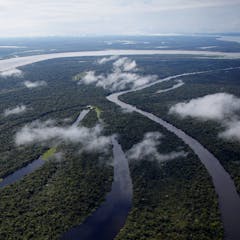
Articles on Meat production
Displaying 1 - 20 of 29 articles

Switching to a plant-based diet could save lives.

Too much red meat – and especially processed meat – is linked to cancer and heart disease. But moderation is the key – alongside better farming practices

Food production in the US is heavily concentrated in the hands of a small number of large agribusiness companies. That’s been good for shareholders, but not for consumers.

The COVID-19 pandemic has highlighted the dangers of unhealthy workplaces and disempowered workers.

If South Africa’s proposed Meat Safety Act gets passed in its present form it opens up the possibility of massive consumption of wildlife.

COVID-19 outbreaks have occurred at more than 100 US meatpacking plants. Geography, workforce demographics and economic concentration make it hard for workers to fight for better conditions.

While there’s no evidence the coronavirus is spread through food or packaging, company executives could be prosecuted if that changes – and they chose to keep a plant open despite a factory outbreak.

Insects are high in protein and rich in other nutrients and, unlike beef and other livestock, have little impact on climate.

One of the largest UK meat processors has launched a new vegan meat product. This was long overdue.

Brazil’s president-elect wants to roll back environmental laws, saying they hurt rural growth. But preventing Amazonian deforestation has actually made farmland more productive.

As the death count in South Africa’s listeriosis outbreak rises, Canadian researchers are isolating bacteria from the microbiome of exotic foods to try to develop a solution.

Netflix’s new film is a timely intervention into discussions on whether it can ever be ethically sound to eat meat.

Eat less meat, save the world

We might be able to grow artificial meat but are people really prepared to eat such produce over meat from farmed animals?

Slaughterhouses are an essential step in meat production. Hygiene standards need to be maintained to prevent the spread of diseases.

Simply calling on people to eat less meat is not very useful. The consumption of meat, after all, is embedded within numerous social and cultural practices. But changing diets can benefit the planet.

Eating cows and sheep is unsustainable. Here are some better alternatives.

As consumption has soared and prices have fallen, the realities of industrial chicken farming often clash with the values of people who live on the urban fringes where broiler farms are sited.

If GST was added to meat, the government could raise billions of dollars in revenue while also encouraging shoppers to eat more veggies - a lipsmacking prospect for public health and the environment.

The recent Lancet Commission report rightly pointed out that climate change is a huge risk to global public health. But it shied away from one of the main issues: the world consumes far too much meat.
